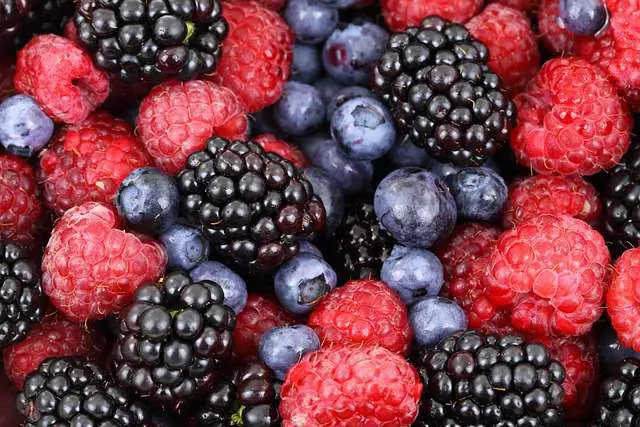Introduction:
The genus Rubus, which also comprises other berries like blackberries, includes nutrition facts of raspberries, which are tiny, juicy, and tasty berries. Although there are also yellow and purple variants, raspberries are typically tiny, red, or blackberries.
They are made up of tiny, separate droplets that assemble around a core. Raspberries have a central stem to which droplets are connected, giving them their distinctive shape.

They are extensively used in many culinary preparations, including as pastries, jams, sauces, and as a topping for fresh fruit, and are well-known for their sweet and slightly acidic flavor.
Nutrition Facts of Raspberries:
Let’s examine the essential nutrients present in raspberries:
Serving size and caloric content
Raspberries have a low-calorie count. About 64 calories are present in a typical serving of raspberries, which is one cup (123 grams).
Due to their low-calorie content, they are a fantastic choice for people watching their calorie consumption is explained in the nutrition facts of raspberries.

Fiber Content
Raspberries are a fantastic source of this substance. You can obtain roughly 8 grams of fiber in a serving of 1 cup.
This high fiber content promotes feelings of fullness, which can help with weight control by assisting with digestion, maintaining healthy blood sugar levels, and supporting healthy blood sugar levels.
Vitamins
• Vitamin C: It is commonly known as ascorbic acid, and is particularly abundant in raspberries. About 54 milligrams of vitamin C, or 90% of the daily required amount, are present in a serving of one cup.
Immune system function, collagen synthesis, and wound healing all depend on vitamin C.
• Vitamin K: A serving of 1 cup of strawberries has about 9.6 micrograms of vitamin K. In maintaining healthy bones and blood clotting, vitamin K is crucial.

Minerals
• Potassium: Raspberries are a good source of potassium, a necessary mineral for maintaining healthy nerve and muscle function as well as blood pressure regulation. You can receive about 186 milligrams of potassium in a serving of 1 cup.
• Manganese: A cup of raspberries contains roughly 0.8 mg of manganese, making them a rich source of the mineral. Manganese contributes to the production of bones and is engaged in some metabolic activities.
Antioxidants
• Anthocyanins: Anthocyanins are a class of antioxidants that give raspberries their vivid red color.
These antioxidants are linked to several health advantages, such as lowering the risk of inflammation and chronic diseases. They also support raspberries’ overall antioxidant capability.
Health Benefits of Raspberries:
Because of their nutrition facts of raspberries and antioxidant content, raspberries have several health advantages. Here are five advantages to your health from eating raspberries:

-
Antioxidant Protection
Ellagic acid, quercetin, and anthocyanins are just a few of the antioxidants found in raspberries. These substances lower the risk of chronic illnesses like heart disease, cancer, and age-related ailments by helping to shield cells from the oxidative damage caused by free radicals.
-
Heart Health
Raspberries’ fiber, potassium, and polyphenol content all have a significant impact on heart health. Potassium helps control blood pressure, whereas fiber lowers cholesterol levels.
The antioxidants in raspberries also improve blood vessel health and cardiovascular health by lowering inflammation.
-
Weight Management
Raspberries have high fiber content and only a few calories per serving. Raspberries are a beneficial complement to a weight-loss strategy because of how this combination can encourage feelings of fullness and lower daily calorie intake.
Additionally, the fiber content promotes a healthy digestive system and reduces overeating.
-
Blood Sugar Regulation
Raspberry fiber and polyphenols can aid with blood sugar regulation. Sugar absorption is slowed by fiber, limiting a sharp increase in blood sugar.
In addition, some research indicates that raspberry ketones, a substance present in raspberries, may be advantageous for regulating blood sugar.
-
Anti-inflammatory Effect
Numerous illnesses, including arthritis and heart disease, are associated with chronic inflammation. The anti-inflammatory qualities of the antioxidants in raspberries can help lower the risk of inflammatory disorders and enhance general health.

How to incorporate Raspberries into the diet:
Following are a few inventive and useful methods to include raspberries in your meals and snacks:
Fresh Snacking: Enjoy raspberries by themselves as a quick and wholesome snack. Prepare a bowl of fresh raspberries and wash them before eating.
Smoothies: Blend raspberries with other fruits like bananas, strawberries, or blueberries to make a smoothie. Honey or maple syrup can be added for sweetness and yogurt or almond milk for creaminess.
Cereal or oatmeal: Add some raspberries to your cereal or oatmeal in the morning. The flavor will be improved by the raspberry’s inherent sweetness.
Yogurt Parfait: To create a tasty and wholesome parfait, layer raspberries, Greek yogurt, and granola. For added texture and taste, drizzle honey over the dish or top with chopped nuts.
Desserts: Add raspberries to ice cream, cheesecake, or chocolate mousse as a garnish. They can also be included in fruit crumbles or tarts.
FAQs:
Can raspberries help you lose weight?
Yes, raspberries are an excellent complement to a weight loss diet because they are low in calories and high in fiber.
Can raspberries help lower blood pressure?
Yes, because raspberries contain potassium, which can help regulate blood pressure.
Do raspberries promote healthy skin?
Yes, raspberries’ high levels of vitamin C and antioxidants can support healthy skin.
Can persons with diabetes eat raspberries?
Yes, raspberries are a low-glycemic fruit that, when consumed in moderation, can be a part of a diabetic-friendly diet.
Are fresh and frozen raspberries equally nutrient-dense?
Frozen raspberries can be a convenient alternative all year long and yet maintain the majority of their nutritious content.
Conclusion:
Last but not least, raspberries are a delectable addition to your diet, providing a variety of health advantages and nutrition facts of raspberries in addition to a sweet and somewhat tangy flavor.
They are a dietary option for preserving general health and wellness due to their rich nutritional profile, which includes high fiber, vitamins, minerals, and antioxidants.
Raspberries are a tasty and adaptable method to improve your diet and support a healthy lifestyle, whether they are consumed fresh, in smoothies, as a topping, or in some recipes.
Therefore, don’t be hesitant to indulge in these colorful and healthy berries to appreciate their delectable flavor and profit from their many health advantages.